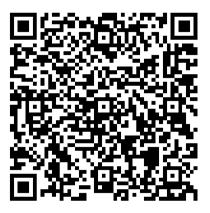





The International Baccalaureate Diploma Programme is an internationally recognised qualification, accepted by universities across the world. With a holistic approach to Sixth Form education the course places the student at the very centre.
The IB is different from A Levels in two other key respects:
– Every student must fulfil the requirements of all three elements of the Core – which consists of Theory of Knowledge (TOK), the Extended Essay (EE) and Creativity, Access and Service (CAS).
– All students study six subjects, three at Higher Level (HL) and three at Standard Level (SL).
Of the six academic subjects selected, one subject must be taken from each of groups 1-5, but for the sixth subject there is flexibility, and you can choose a subject from Arts subjects (Music, Theatre or Visual Arts), or an additional subject from groups 2-4, or a School Supported Mother Tongue.
Assessment in all subjects is by both internal assessment and by externally marked examinations.
Subjects are scored on a 1-7 scale with 3 further points available from TOK and the Extended Essay combined. A Diploma can be obtained with a total of 24 points, but many students score well above this.
The key attributes developed during the course, which is assessed at the end of the two years, are represented in the IB Learner Profile, and feature strongly in the list of qualities desired by top universities.
The IB expects that its students will become IB learners and develop these essential qualities:
– Enquirers – Knowledgeable – Thinkers – Communicators – Principled – Open-minded – Caring – Risk-takers – Balanced – Reflective
“The IB puts you significantly ahead in the global race for the best universities.” THE GOOD SCHOOL GUIDE
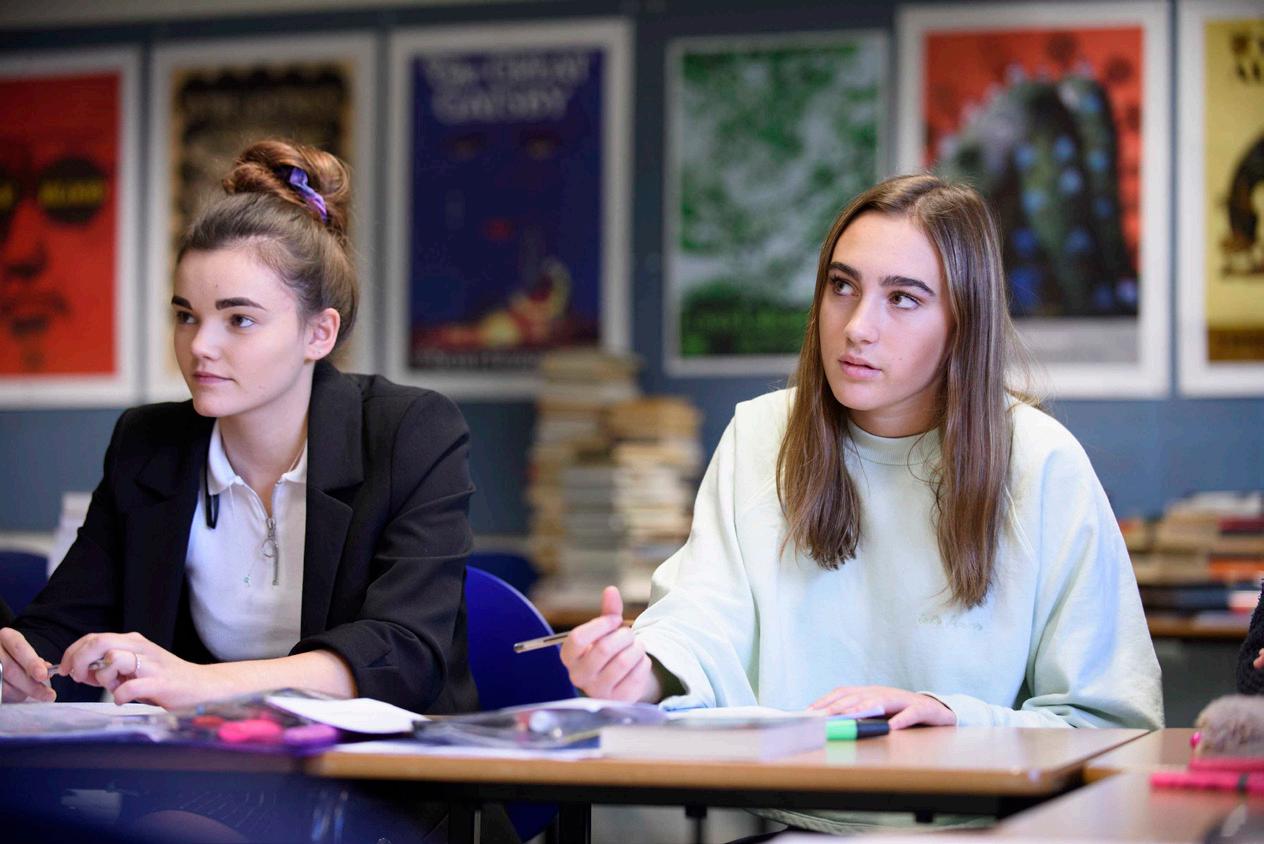
Studying English Literature in the Sixth Form is an enriching experience. The IB Diploma English Literature course offers you the chance to explore the diversity of world literature across many different historical periods and regions of the world, alongside more familiar works by British authors.
You will explore texts in translation, whether that be a modern Japanese novel by Haruki Murakami, an Argentinian novella by Samantha Shweblin or a more well-known author such as Franz Kafka or Henrik Ibsen. Woven through the course are several works written originally in English. We read and study less familiar texts such as Alice Munro’s short stories or Translations by Brian Friel, as well as more familiar works by Woolf, Larkin, Blake, Eliot or Shakespeare. The ethos of the course is inclusive, reflecting the breadth and richness of all that literature can mean and has meant through the ages.
HEAD OF SUBJECT
Jamie Owen
SCAN HERE to find out more about the structure and assessment of this course
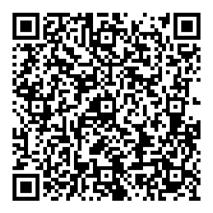
“IB English Literature provides a globalised and diverse syllabus of literature texts, allowing a fascinating exploration into new perspectives.”
CURRENT Y13 RHB STUDENT

The IB French B course is designed to help you develop your language skills and cultural understanding. You will be practising your oral and written skills in a range of contexts such as letters, speeches, newspaper articles, diaries, factual pieces, instructions, analytical essays and imaginative work.
You will study topics of global and personal relevance, the environment, the family, cultural diversity, health, tourism, conflict, politics, popular culture and the media. You will work towards developing an understanding of the structure of the language by close examination of texts. At Higher Level you will read two works of French literature.
RHB IB French students have gone on to study exciting courses recently including French & History of Art at UCL, French and Politics at University of Edinburgh and French with Spanish at Oxford.
Modern linguists are in high demand because of the analytical and communication skills developed through learning a language. Careers include interpreting, translating, teaching, international relations, and tourism. French students and graduates are also highly sought after in the fields of business, banking, accountancy, and law.
Katie White
SCAN HERE to find out more about Languages B course at Standard or Higher Level
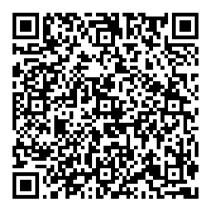
“IB French is a world away from GCSE – the course is less defined by topic areas giving more freedom in your work. I really enjoy the variety of work; from film and music to literature and culture work. “
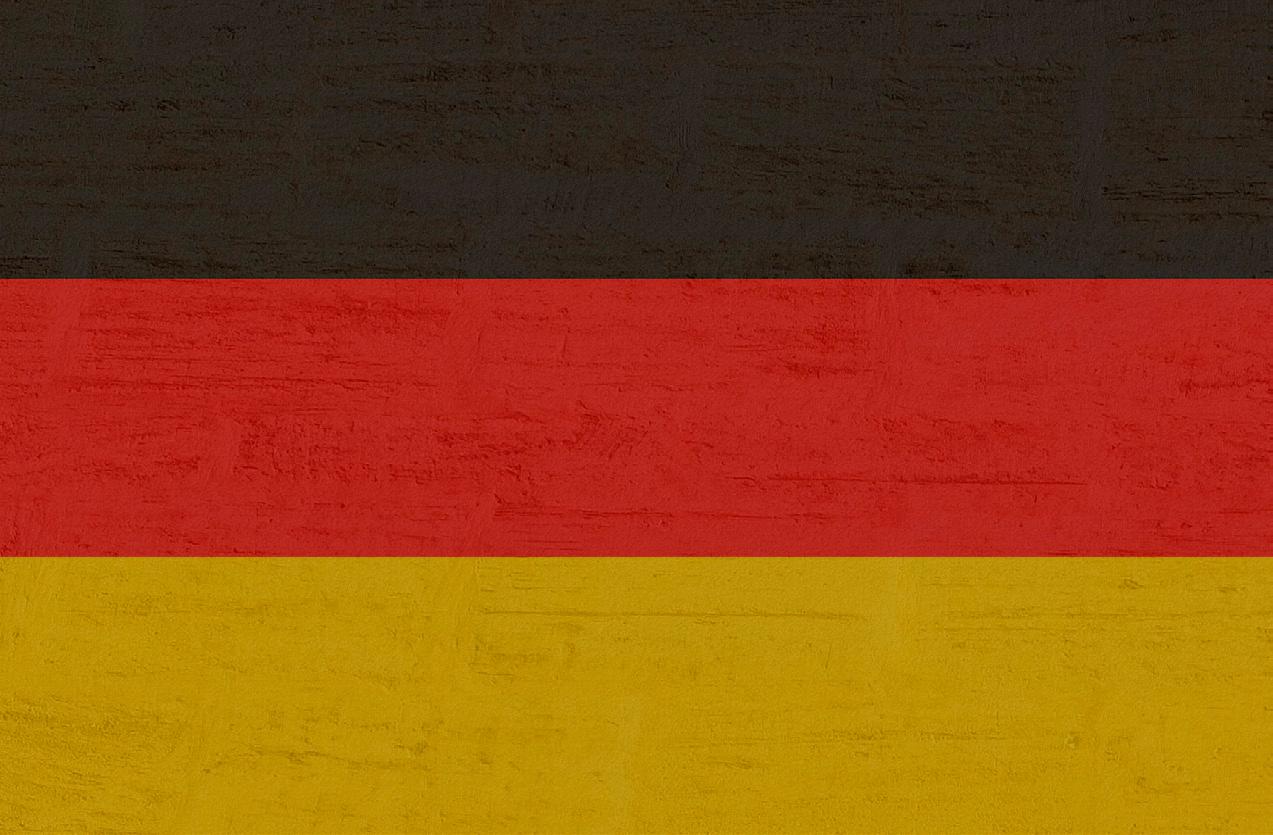
The IB Diploma Programme German course aims to develop oral and written skills in a range of contexts such as letters, emails, speeches, blogs, factual pieces and imaginative work. You will study topics of global and personal relevance; the environment, the family, cultural diversity, health, immigration, popular culture and the media. Our audio materials are available on Teams and used in lessons, as well as music, poetry and cinema.
You will be building upon the skills learnt and developed at GCSE, becoming more proficient at listening, speaking, reading and writing. At Higher Level, an exciting and rewarding part of the course is the study of literature, which will give you insights into the German cultural psyche.
German IB can take you in many directions. It opens opportunities for studying or working in German-speaking countries, especially in fields like business, engineering, and science. With Germany being a leader in technology and innovation, it gives you an edge in global markets. Plus, fluency in a second language can improve communication skills, cultural understanding, and critical thinking, all valuable in any career.
Andrea Wilkie
SCAN HERE to find out more about the Languages B course at Standard or Higher Level

“Studying German in the IB has expanded my world. It’s more than just learning a language –it’s about understanding a new culture and mindset. I highly recommend it!”
IB ALUMNA
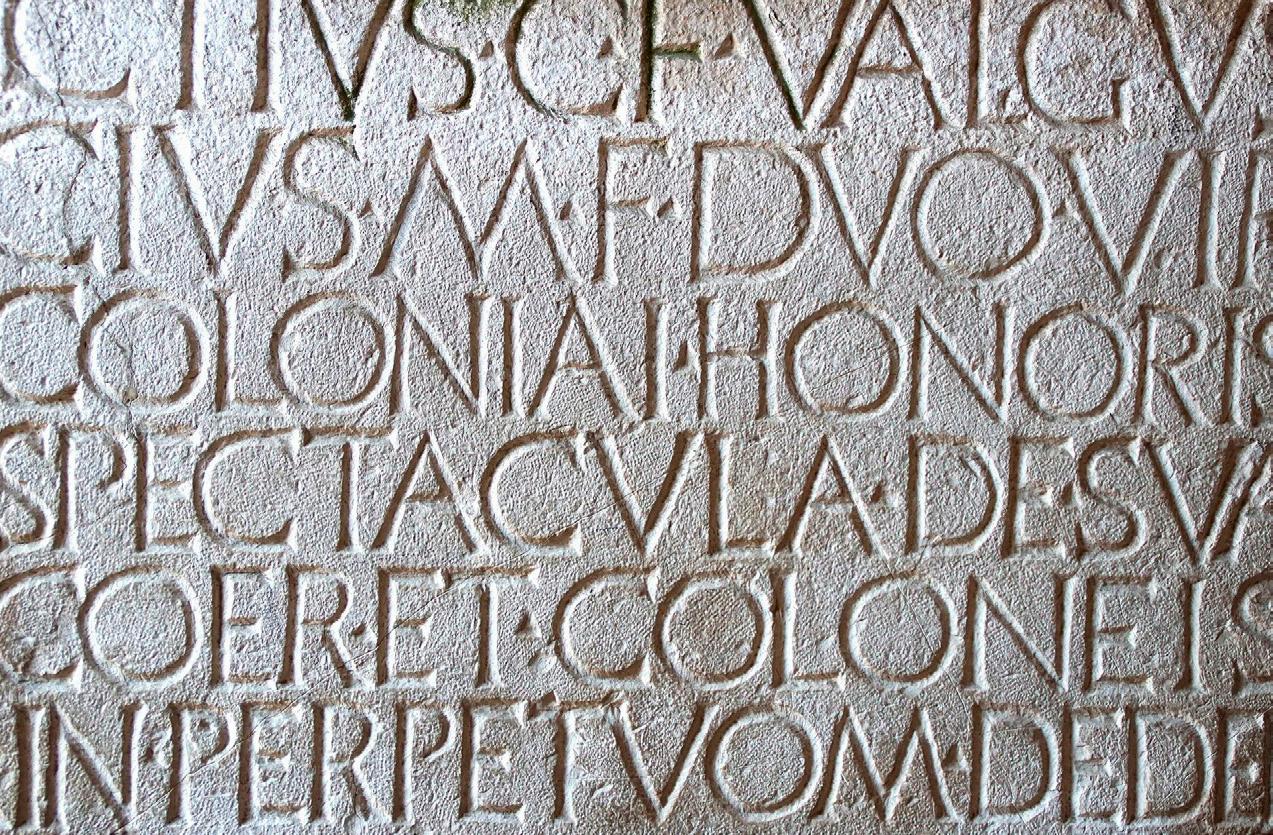
The IB Diploma programme provides an exciting opportunity to explore the language, literature and culture of ancient Rome. Through the study of classical texts and interaction with the culture of Greece and Rome the course encourages an awareness and appreciation of the different perspectives of people from ancient cultures, it develops students’ appreciation of the literary form and provides opportunities for enjoyment, creativity and intellectual stimulation through individual research. The study of Latin offers a bridge between the contemporary world and the civilisations of antiquity.
RHB Students have gone on to study Classics at University of Nottingham, Archaeology and Ancient History at University of Cardiff, Classics at Durham (also Medicine, Biology and Modern Languages).
Although you do not need to study Latin to have a successful career in science or medicine, it undoubtedly helps. Indeed, whether finance or law, politics, academia or media, your classical education will build connections between many modern aspects of life and their roots in the ancient world.
You will be encouraged to extend your study beyond the classroom, through attending lectures and educational visits, including opportunities to visit classical sites in Britain, Italy or Greece.
Claire Binney
SCAN HERE to find out more about Classical Languages IB at Standard or Higher Level
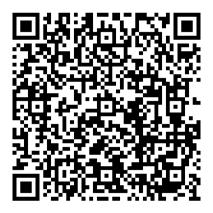
“I love how logical Latin is and being able to read source material from the ancient world in the original language. I chose it because it was a unique and exciting subject to study. I’ve discovered a lot more about the English language and the etymology of many words.”
CURRENT Y13 IB SL STUDENT, ANASTASIA

The IB Chinese B Standard Level course is designed for students with some previous experience in the language. It focuses on developing the ability to communicate effectively in Chinese across a range of contexts and themes, while also enhancing students’ understanding of Chinese-speaking cultures through authentic texts and media. The course covers five core themes such as identities, experiences, human ingenuity, social organization, and sharing the planet.
Learning to write Chinese characters promotes the creativity needed for a wide range of jobs. Moreover, to be able to communicate in a unique language like Mandarin makes you stand out from the crowd, providing more job opportunities. Learning Chinese can benefit your future career by expanding the potential range of employment for you. Students have gone on to study Mandarin alongside another discipline, or as a standalone subject.
HEAD
Yuanrong Liu
SCAN HERE to find out more about the IBDP Languages B course at Standard or Higher Level


The IB Spanish course aims to develop oral and written skills in a range of contexts such as letters, speeches, newspaper articles, diaries, analytical essays and imaginative work. You will study topics of global and personal relevance, for example, the environment, the family, cultural diversity, health and tourism.
By the end of the course, you will be able to speak Spanish with confidence and fluency and be able to use your language skills at a high level, for example in the workplace, further study in higher education or on a placement year abroad as part of a degree course. The study of a novel and a play at Higher level is an exciting opportunity for students who enjoy literature.
Apart from all the jobs that use languages directly (travel, teaching, interpreting, business, politics etc) the other skills that you develop are directly transferable in other areas. These skills include communication, flexibility, global awareness, and a rigorous and detailed approach to study. Learning Spanish opens huge possibilities for travel and business in Spain, South America and Central America as well as in some important areas in the USA. Former students have gone on to study course combinations such as Spanish and Arabic, Spanish and International Relations, Spanish and English and Spanish and Biology.
Jo Cossey
SCAN HERE to find out more about the IBDP Languages B course at Standard or Higher Level

‘I love the variety of the subject, from speaking to grammar to culture. I have discovered a lot about South America, its traditions and history and it has inspired me to travel there in the future, with the language tools to engage with people living there’
RHB ALUMNA
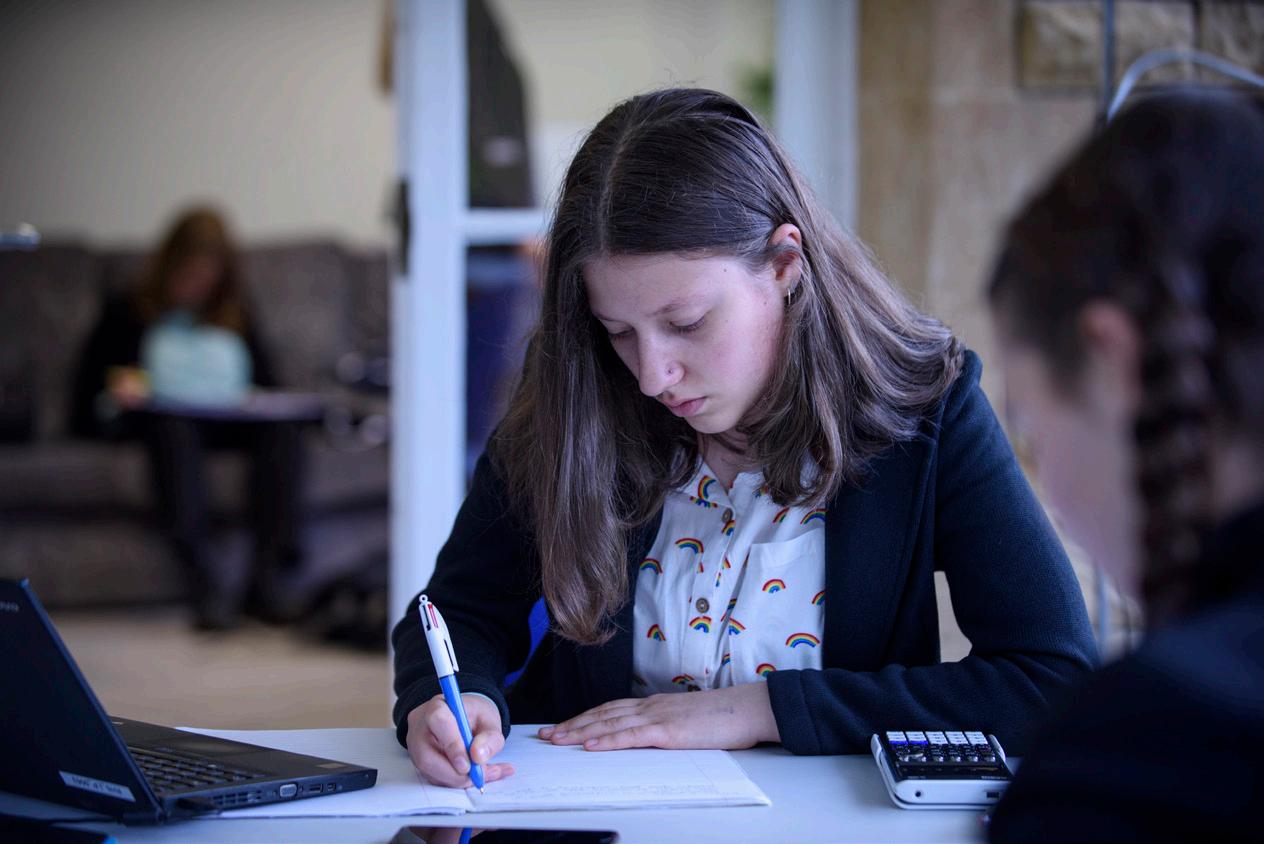
The IB course will give you a sound grasp of the theory that economists use to explain events, predict what will happen, and advise governments on how to run the economy. The subject will help you to understand much about the contemporary world, its challenges, conflicts and possibilities for improvement. To succeed in Economics you need to have an enquiring mind, good analytical reasoning skills and sound basic numeracy. You also need to keep abreast of what is happening in the world. This is what really brings the subject to life.
Economics lends itself to the development of a wide range of highly transferable skills and is a gateway to a number of varied and fascinating careers which are both rewarding and influential. Possible careers include Economist, Investment banking, Statistician, Stockbroker, Accountant, Financial Analyst, Financial Manager, Financial risk Analyst and Actuary.
HEAD OF SUBJECT
Swati Rao
SCAN HERE to find out more about IBDP Economics at Standard or Higher Level
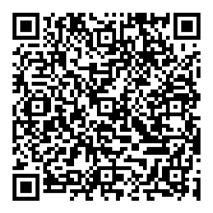
“Studying Economics has helped me to think about the news very differently. We look at normal news articles and find all of the Economics within it. There is much more Economics in our everyday life than we think, unless you are looking for it“
RHB ALUMNA
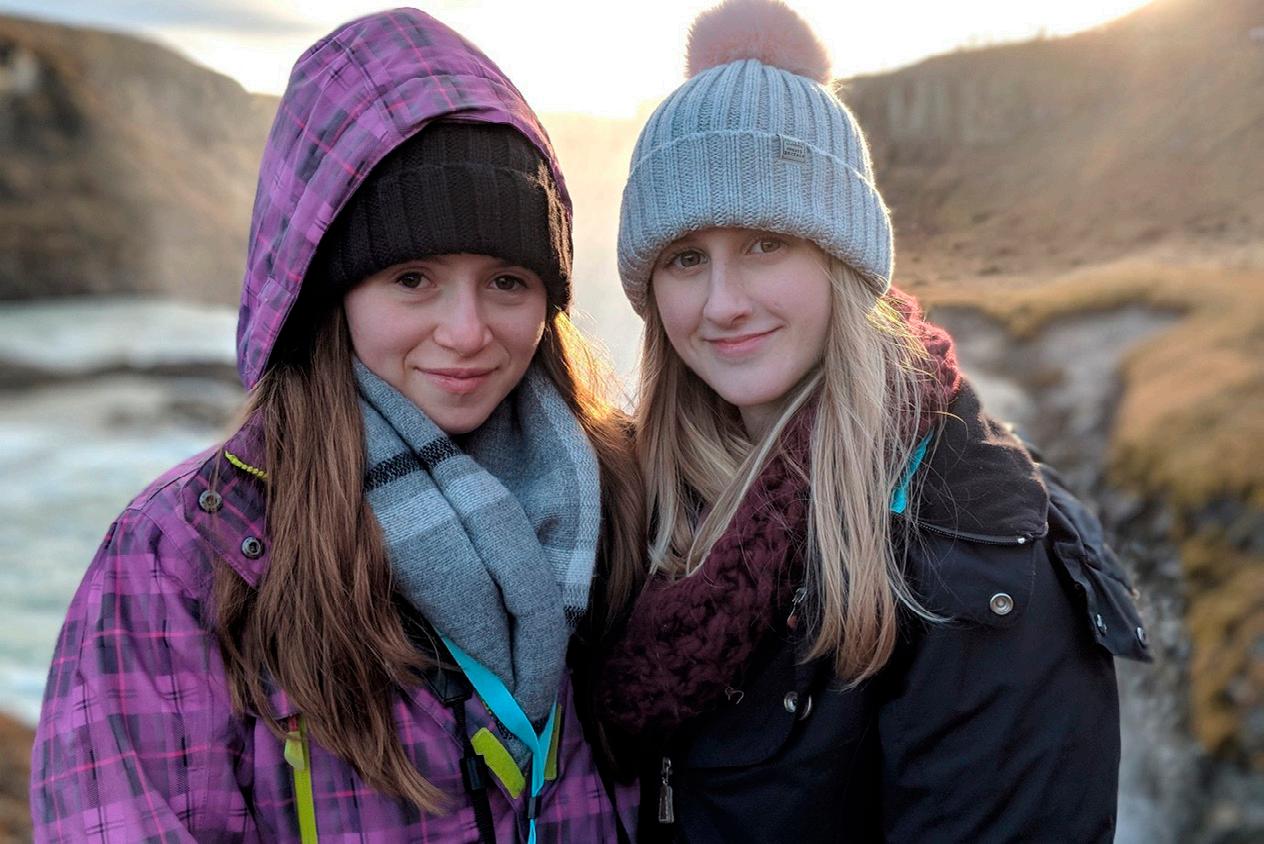
Geography gives an opportunity to really develop your internationalism during the IB Diploma Programme. Higher Level and Standard Level students will study the core themes on population change, climate change and our use of food, energy and water resources.
There are also optional units we select from. Standard level will complete two of these while Higher level students will complete three. These include river processes and management including managing flood risk; studying the hazards associated with earthquakes and volcanic events; understanding the changes affecting urban areas.
Higher Level students will study a further unit of extension topics related to the processes of globalisation, migration and global development.
Students who completed the geography course have gone on to study a wide range of courses from Fine Art to Medicine. A number of students have chosen to study Geography at university, including recently at Oxbridge. Others have taken up courses in environmental conservation, marine biology and town planning all of which have close links to geography.
Raphael Heath
SCAN HERE to find out more about IBDP Economics at Standard or Higher Level
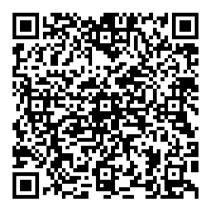
“IB Geography gives me a perspective on how the real world around me is today, also giving me the tools to analyse data and circumstances in a effective way.”
RHB ALUMNA

History at IB is a truly global course that covers modern world topics, expanding from the euro-centric approach of GCSE courses. There are three examined units and the Internal Assessment coursework. Move to Global War is a source-based paper with case studies on Japan, Germany and Italy. In Paper 2 we compare and contrast the Authoritarian States of China and Germany and study the Cold War. For Higher Level only there is an additional essay-based paper and we focus on Russian history for this.
Coursework involves a 2,200 word essay on any topic. It has three parts: critical analysis of sources; a balanced evaluative essay and a final reflection.
Many of our students go on to study History at university but Law, International relations and Liberal Arts degrees are also very popular. Destinations of recent leavers include Oxford, Edinburgh, Exeter and Manchester.
History is a highly regarded academic subject and as such is the gateway to many professional careers most notably law, journalism and the media, politics and the Civil Service.
Harriet Pagnamenta
SCAN HERE to find out more about IBDP History at Standard or Higher Level
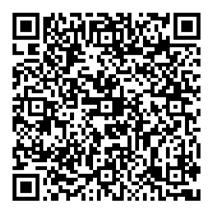
“I loved studying IB History, the course covers so much breadth and allows exploration into History on a global level. It’s such an engaging and thought-provoking course. It encourages you to think independently and critically by evaluating different historical perspectives.”
ANNABEL NOYCE, CLASS OF 2024
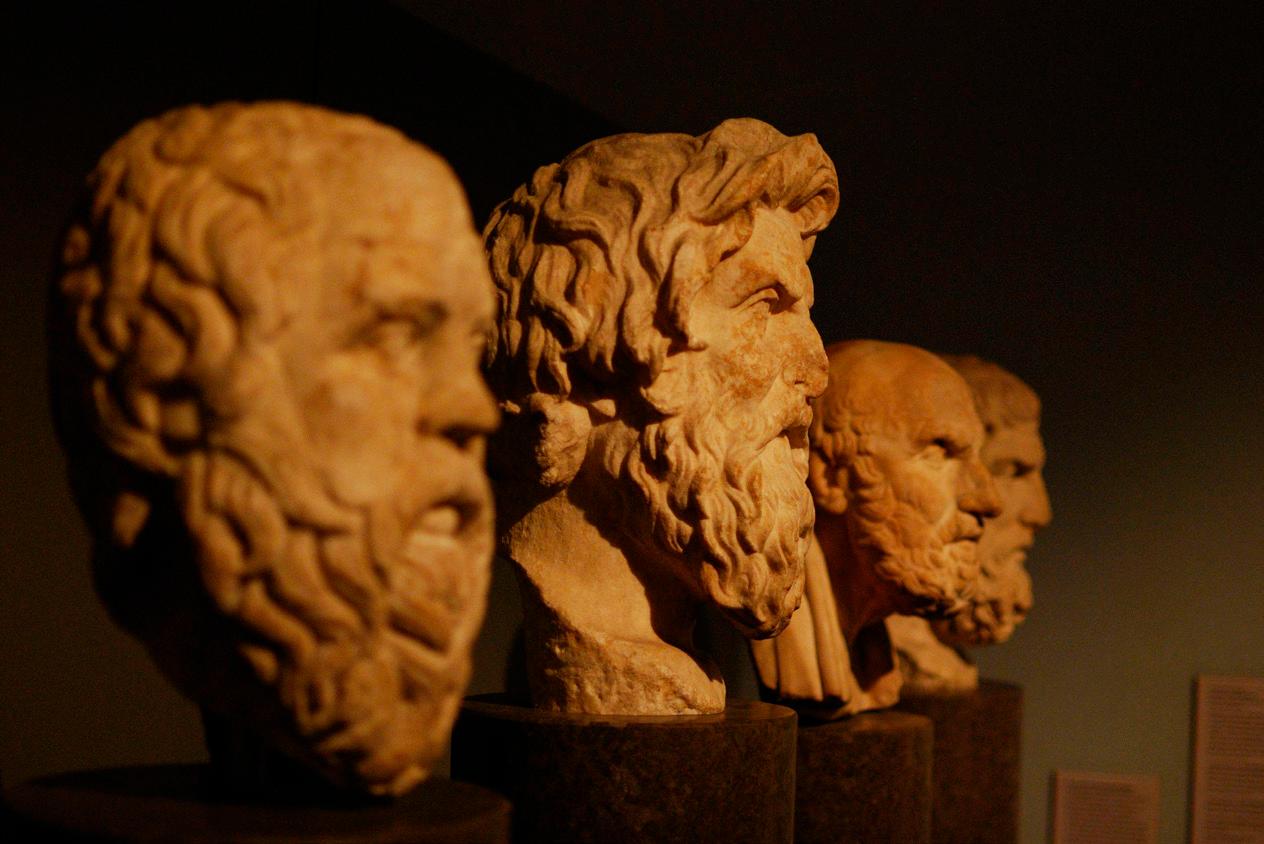
The distinguishing feature of IB philosophy is the emphasis on ‘doing philosophy’ rather than just learning about it. The course is focused on stimulating your intellectual curiosity and encouraging you to examine both your own views and those of others. You are expected to investigate and explore the ideas for yourself. You will learn to develop your own philosophical voice and to think for yourself. You will learn to scrutinise texts and arguments in order to analyse and evaluate them. You will also learn to take your philosophical skills and apply them to real life situations.
Philosophy develops highly transferable skills such as the ability to formulate arguments clearly, to make reasoned judgments and to evaluate highly complex and multifaceted issues. Philosophy leads to all sorts of careers in the arts, law, journalism, politics, languages. It helps with people-centred careers and medical ethical decisions. But most of all it teaches you to think and question, and argue logically and coherently about yourself and the world. Whenever important laws are drawn up in this country philosophers are asked to help decide them. Philosophers aren’t just academics; they look at real moral, political and cultural issues.
Emma Bridgeman
SCAN HERE to find out more about IBDP Philosophy at Standard or Higher Level

“IB Philosophy is great because you consider everyday problems and examples and see that there are deep academic answers and lots of perspectives to think about.”
RHB CURRENT Y13
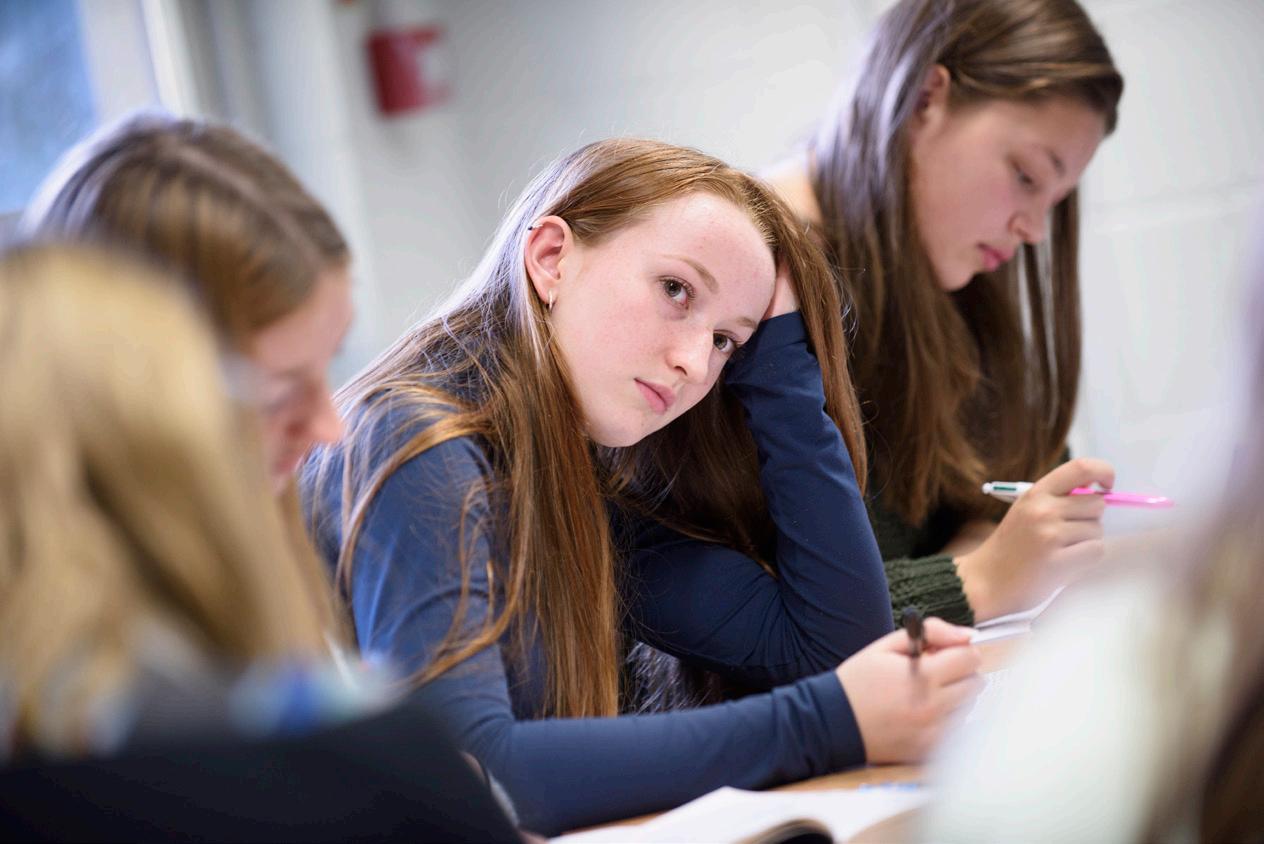
Students taking IB Psychology can expect to develop an understanding of how psychological knowledge is generated, developed and applied. This will allow them to have a greater understanding of themselves and appreciate the diversity of human behaviour.
The holistic approach reflected in the curriculum, which sees biological, cognitive and sociocultural analysis being taught in an integrated way ensures that students are able to develop an understanding of what all humans share, as well as the immense diversity of influences on human behaviour and mental processes. The ethical concerns raised by the methodology and application of psychological research are also key considerations of the IB psychology course.
RHB Students have progressed to study at degree level in Psychology, Applied psychology and Business management, Psychological and behavioural studies and Criminology and Forensic studies. Studying Psychology will benefit students who choose a profession in Teaching, Police, Law, Healthcare and Social services.
Stephanie Looker
SCAN HERE to find out more about IBDP Psychology at Standard or Higher Level
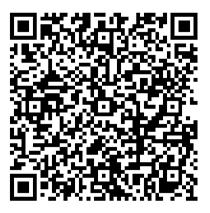
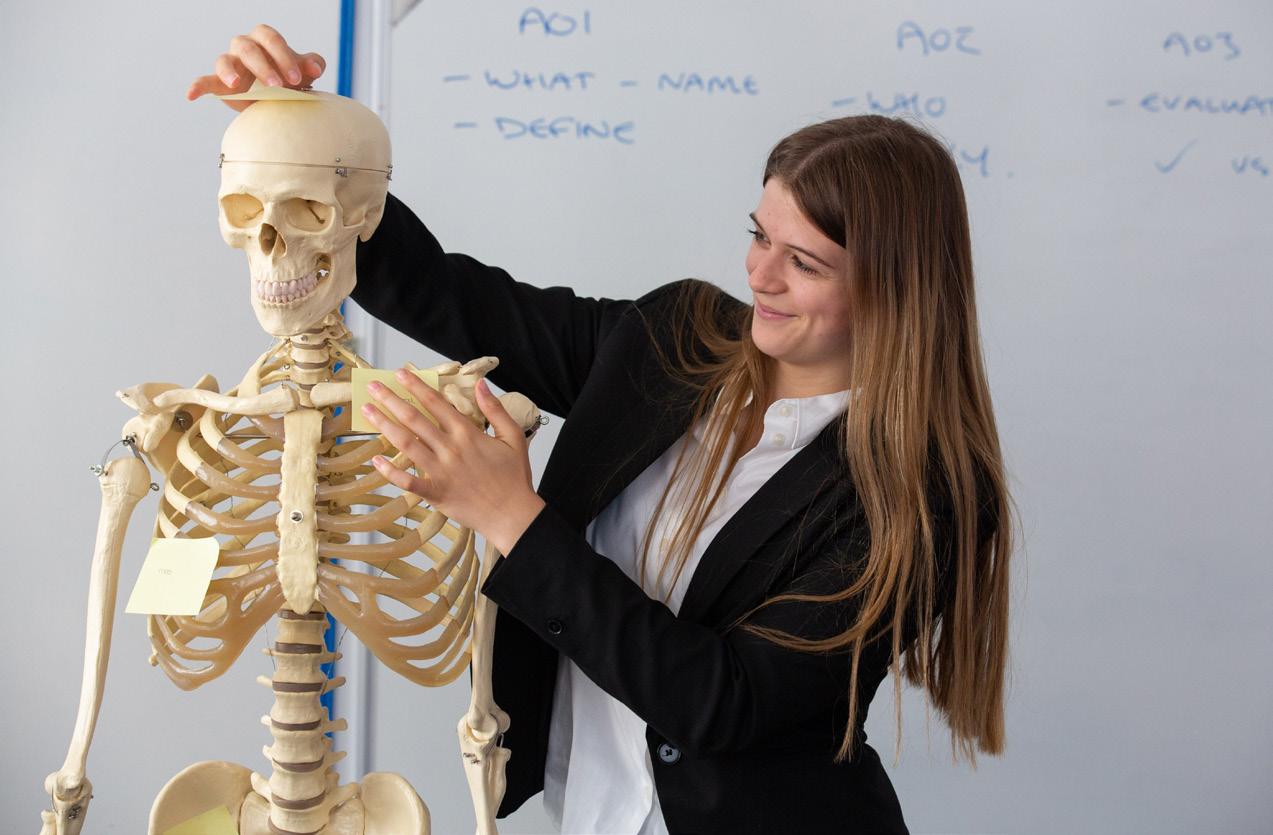
Biologists investigate the living world at all levels using many different approaches and techniques. At one end of the scale is the cell, its molecular construction and complex metabolic reactions. At the other end of the scale, biologists investigate the interactions that make whole ecosystems function. Many discoveries remain to be made and great progress is expected in the 21st century.
RHB Biology students have gone on to a number of exciting courses at top universities, recently including Marine Biology at University of Exeter, Biology with a modern language at Manchester University, Biochemistry at Kings College London, Medicine at Oxford, Biomedical Sciences at UWE and York University. Studying Biology opens-up a wide range of career opportunities, particularly in the fields of science, healthcare and the environment.
HEAD OF SUBJECT Sinead Duignan
SCAN HERE to find out more about IBDP Biology at Standard or Higher Level
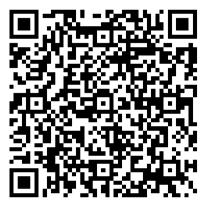
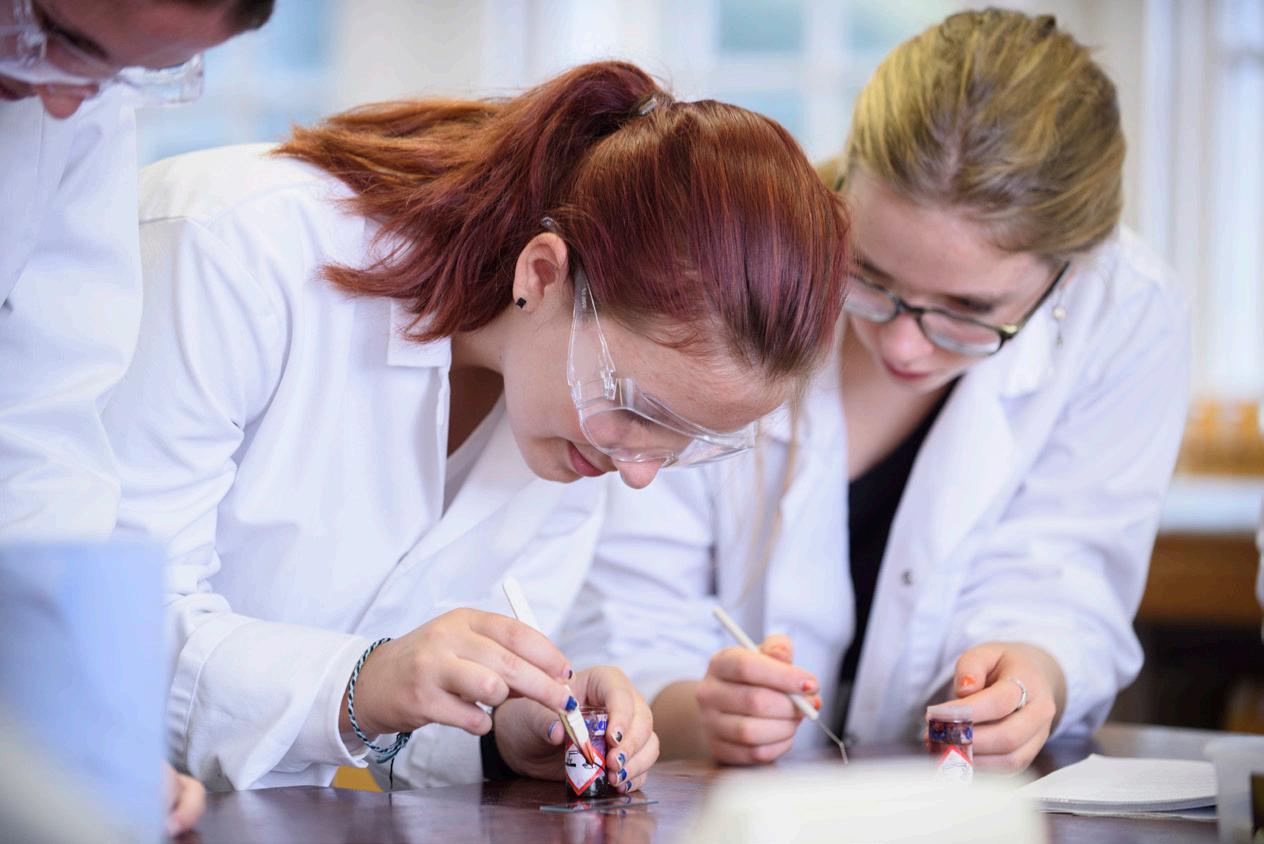
Chemistry is an experimental science that combines academic study with the acquisition of practical and investigational skills. It is often called the central science as chemical principles underpin both the physical environment in which we live and all biological systems. Apart from being a subject worthy of study in its own right, chemistry is often a prerequisite for many other courses in higher education, such as medicine, biological science and environmental science.
RHB Chemistry students have gone on to top universities to study courses including Biochemistry at Kings College London, Medicine at Oxford and University of Exeter and Biomedical Science at UWE and York University.
Tim Nobbs
SCAN HERE to find out more about IBDP Chemistry at Standard or Higher Level

“Studying chemistry in sixth form is like seeing the world from another angle. Once you understand one topic in chemistry you realise that they are all linked and make sense together.”

The IB computer science course is a rigorous and practical problemsolving discipline.
This important STEM subject gives students an experience of how computers and network operate, from the very basics of logic gates to how search engines work. Computer Science is a practical subject where students can apply the academic principles learned in the classroom to real-world systems. It’s an intensely creative subject that develops logic and problem-solving skills as well as resilience and higher-level thinking.
There is a huge gender bias in this area and we are proud to be able to encourage our students to believe that girls and women can excel in in this subject.
Almost every year we have several students opting to study Computer Science or Software Engineering after leaving school, but equally it has opened other degree opportunities such as robotics, AI and Crime and Security Science. Students have also gone onto undertake fully sponsored degrees with PWC.
Daniel Harvey
SCAN HERE to find out more about IBDP Computer Science at Standard or Higher Level
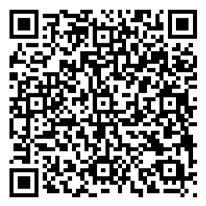
“I chose Computer Science because I enjoy problem solving. Through coding different types of programs I have gained new perspectives which can be applied to solving questions in my other subjects.”

Physics is the most fundamental of the experimental sciences, as it seeks to explain the universe itself from the very smallest particles to the vast distances between galaxies.
Despite the exciting and extraordinary development of ideas throughout the history of physics, observations remain essential to the very core of the subject. Models are developed to try to understand observations, and these themselves can become theories that attempt to explain the observations.
RHB Physics students have recently gone on to study Physics at top universities including Imperial College of Science Technology and Medicine London and Cardiff, as well as courses including Design Engineering at Aston University, Medical Microbiology at University of Bristol, Mathematics at Birmingham University, and Engineering Degree Accelerator Programme at Heriot-Watt University.
SCAN HERE to find out more about IBDP Physics at Standard or Higher Level
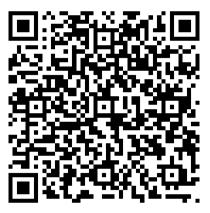

IBDP Design Technology aims to develop internationally-minded people whose enhanced understanding of design and the technological world can facilitate our shared guardianship of the planet and create a better world. It focuses on analysis, design development, synthesis and evaluation. The creative tension between theory and practice is what characterizes design technology within the DP sciences subject group.
Our Design Technology students go onto continue their studies at some of the top universities in the country including UAL Central St Martins, Loughborough, Nottingham Trent, Leeds, Cambridge, Oxford and University of Bath.
Torie Gill
SCAN HERE to find out more about IBDP Design Technology at Standard or Higher Level
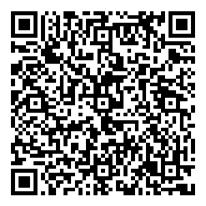

The course helps pupils develop skills and techniques in scientific inquiry, data analysis, collaborative lab work and critical thinking, whilst exploring the interdisciplinary nature of sport and health science, physiology and psychology. Both a blend of theory and practical are used to deliver the course, with an Internal Assessment (IA) requiring pupils to complete a lab-based investigation on a topic of the choice, applying scientific methods and principles outside of the classroom. Assessed across two papers and an IA.
Past students have gone on to study Sports Science at a range of Russell Group Universities, Loughborough and Bath which are regarded as the top universities for these subject choices, as well as further afield including North Carolina, USA.
Jack Perham
SCAN HERE to find out more about IBDP SEHS at Standard or Higher Level
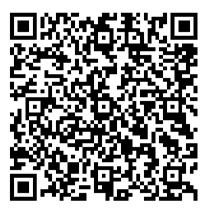
“I have really enjoyed studying HL SEHS, particularly the anatomy topics. I really love these lessons as they are always enjoyable and engaging.”
RHB Y13 STUDENT

IBDP mathematics courses serve to accommodate the range of needs, interests and abilities of students, and to fulfil the requirements of various university and career aspirations. The aims of these courses are to enable students to develop mathematical knowledge, concepts and principles, develop logical, critical and creative thinking and employ and refine their powers of abstraction and generalisation. Students are also encouraged to appreciate the international dimensions of mathematics and the multiplicity of its cultural and historical perspectives.
RHB IBDP Students can select from one of these two course options:
Mathematics: Applications and Interpretation Or
Mathematics: Analysis and Approaches
Craig Graham
SCAN HERE to find out more about these IBDP Mathematics courses at Standard or Higher Level
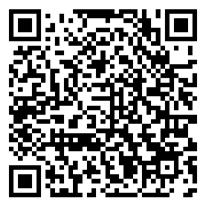
“Maths has been a great help in Physics. Learning to follow things logically helps me form arguments in my essay-writing subjects.”
RHB Y13 IBDP STUDENT

Through the IBDP Music course, students will develop to become well-rounded modern musicians through a combination of practical work, theoretic and technical training and the development of creative competencies. This holistic course achieves this by scaffolding and integrated approaches to deep listening skills, performance proficiency , compositional craft, the ability to discuss music critically, the ability to justify creative choices, and the capacity for entrepreneurship in the musical world.
RHB students have gone on to study an exciting range of music degree courses at prestigious universities including Popular Music at Royal Northern College of Music, Music and Drama at Royal Welsh College of Music and Drama, Jazz Music at London’s Trinity Laban Conservatoire of Music and Dance, Film Music at University of Oxford, Music Technology at University of Leeds and Music with a Choral Scholarship at University of Cambridge.
Mark Bradbury
SCAN HERE to find out more about IBDP Music at Standard or Higher Level
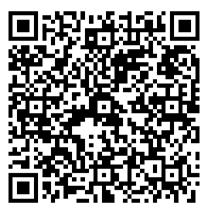
“Studying music at Royal High Sixth Form offers so many opportunities to build confidence and hone performance skills, with regular concerts, recitals, and competitions, including Young Musician of the Year.”
YANNIS, CURRENT STUDENT Y13
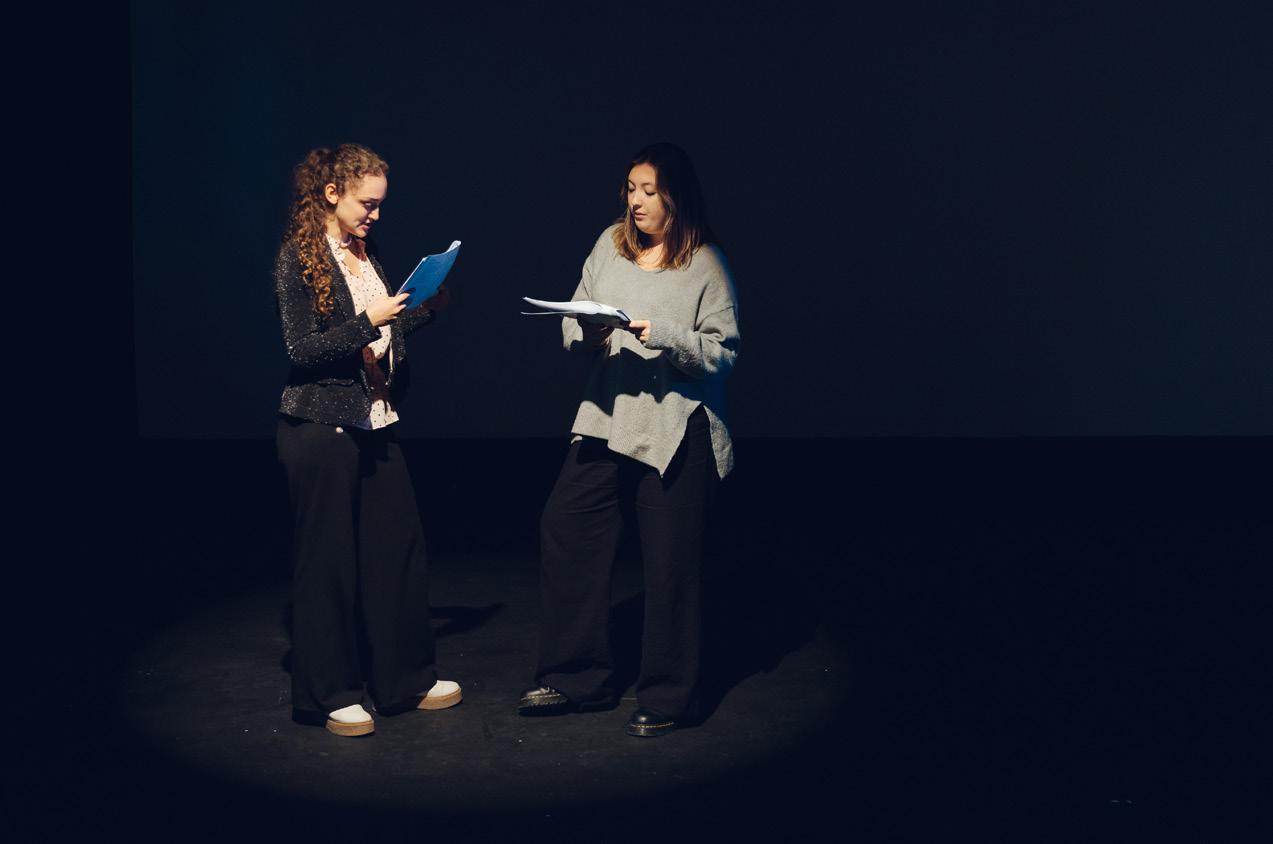
The IBDP Theatre course is a multifaceted theatre-making course of study. It gives students the opportunity to make theatre as creators, designers, directors and performers. It emphasizes the importance of working both individually and collaboratively as part of an ensemble. It offers the opportunity to engage actively in the creative process, transforming ideas into action as inquisitive and productive artists.
Students experience the course from contrasting artistic perspectives. They learn to apply research and theory to inform and to contextualize their work. The theatre course encourages students to appreciate that through the processes of researching, creating, preparing, presenting and critically reflecting on theatre –as participants and audience members – they gain a richer understanding of themselves, their community and the world.
Recent RHB Theatre students have gone on to train at nationally and internationally recognised Drama schools and Universities such as: Mountview and ArtsED and both Royal Holloway and Goldsmith Universities. Many of our students have been awarded places at illustrious universities including those of the Russell Group and Oxbridge.
SCAN HERE to find out more about IBDP Theatre at Standard or Higher Level

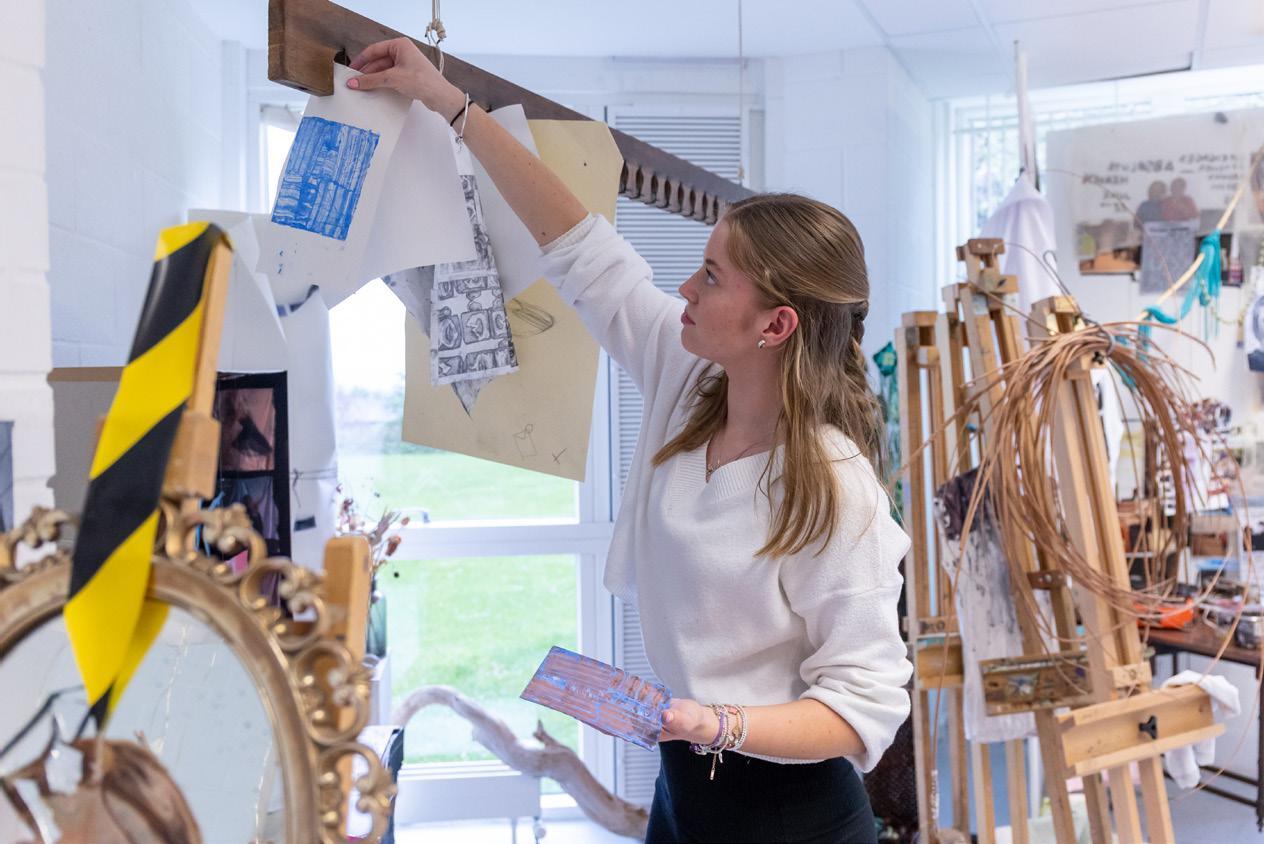
The IB Diploma Programme visual arts course encourages students to challenge their own creative and cultural expectations and boundaries. It is a thought-provoking course in which students develop analytical skills in problem-solving and divergent thinking, while working towards technical proficiency and confidence as art-makers. In addition to exploring and comparing visual arts from different perspectives and in different contexts, students are expected to engage in, experiment with and critically reflect upon a wide range of contemporary practices and media. The course is designed for students who want to go on to study visual arts in higher education as well as for those who are seeking lifelong enrichment through visual arts.
Supporting the International Baccalaureate mission statement and learner profile, the course encourages students to actively explore the visual arts within and across a variety of local, regional, national, international and intercultural contexts. Through inquiry, investigation, reflection and creative application, visual arts students develop an appreciation for the expressive and aesthetic diversity in the world around them, becoming critically informed makers and consumers of visual culture.
We recommend that students attend a one-year Art Foundation after A Levels so they can really hone their skills towards a particular discipline and chose the correct Degree Pathway for them. However, students can go straight to their chosen Degree. Recently our students have done on to study Architecture at Cambridge, Illustration at Falmouth College of Art, Fine Art at The Slade, Theatre Design at UCL, Concept Art for Games and Film at Staffordshire University to name but a few.
SCAN HERE to find out more about IBDP Visual Arts at Standard or Higher Level
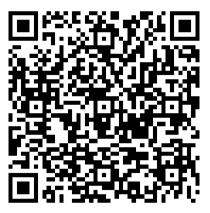
Creativity, Activity and Service (CAS) is at the centre of the IB Diploma. It provides an opportunity for you to follow talents, hobbies and interests outside the classroom and to develop many other skills which are valuable to life beyond school. It is not taught, though some school time is dedicated to CAS activities.
While CAS is not formally assessed in the sense of examinations, in order to obtain a Diploma you do need to fulfil the requirements of three Creativity, three Activity and three Service activities during the two years of the course.
You also pursue one or more long term projects such as the Red Cross International Ambassadors, the Crane Academy Team, or working outside school for a charity. Assessment is through the reflections you engage in before, during and after each activity.
A CAS log or journal is essential so that you monitor your own learning in such areas as ethical and global awareness, collaboration and perseverance and assess how and in what ways you have been able to help others.
CAS focuses you on the core of the IB educational philosophy: your development as a whole person.
Your activities, freely chosen, will enable you to appreciate the potential of people by pushing your own personal growth and helping others with theirs; to become aware of humanitarian issues in the world and the ethical responsibilities you have as a global citizen; to discover more about your own talents; to develop greater autonomy and to enjoy yourself and others as human beings.
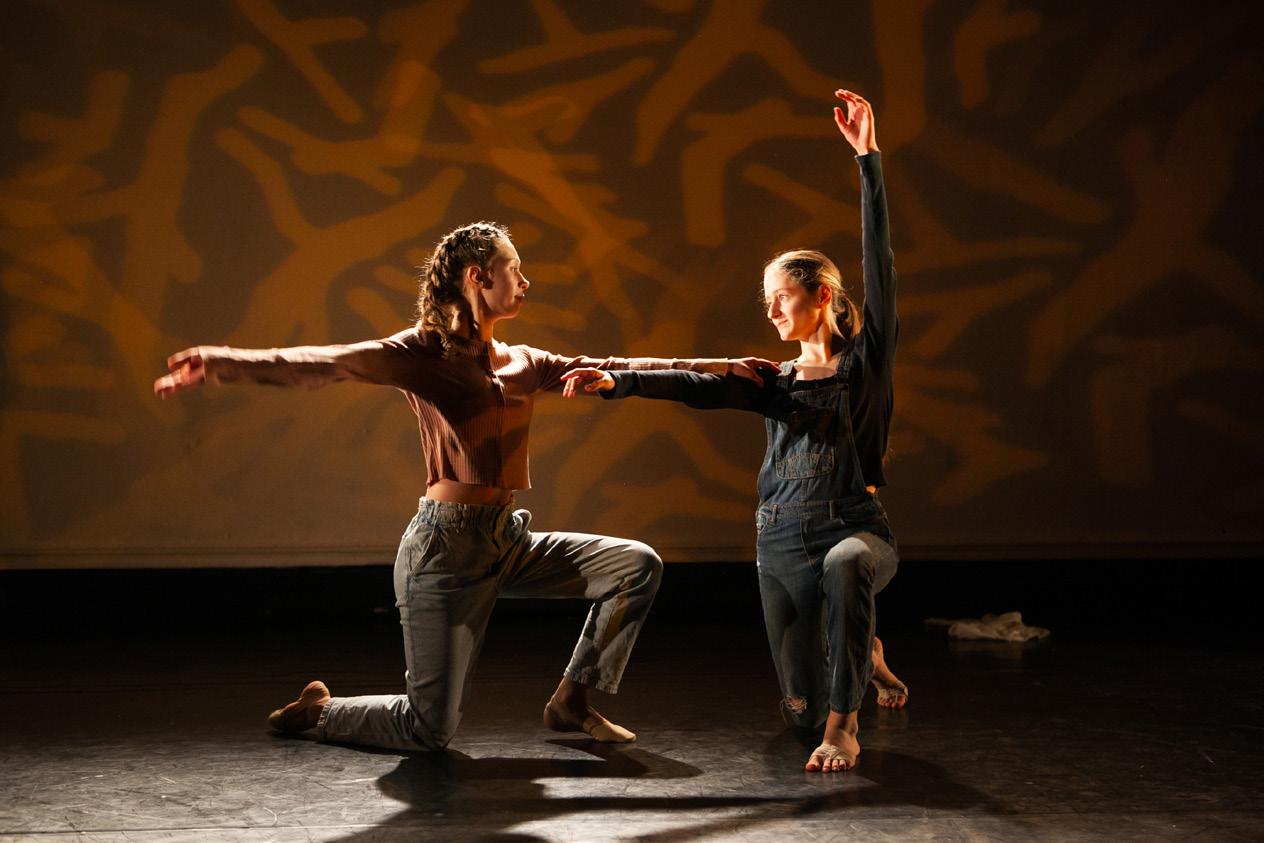
While you will need to develop initiative and find activities of your own outside school, there is a wealth of activities offered within school. As indicated above, it is essential to undertake at least one project, combining two or more of the elements, but in addition you can do:
– Yoga (A)
– Ceramic and Pottery (C)
– Rock Climbing (A)
– Singing in a Choir (C)
– Editing the school magazine or the Sixth Form Magazine (C)
– Coaching a football team (A)
– Training for and running a half marathon (A)
– Participating in a school Drama production (C)
– Helping a child learn to read (C/S)
– Helping an elderly person keep their independence (C/A/S)
– MUN (C)
– Dance (C/A)
– Debating (C)
– Participating in Race for Life (A/S)
– Duke of Edinburgh Award Expedition (A)
– Young Enterprise (C)
– Supporting our partner schools
The Crane Academy (Kenya).
SCAN HERE to find out more about this course
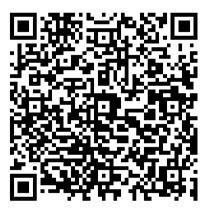
“I was able to meet some of the most special people in my life and to more clearly define my values and future goals.”
“I felt like I was physically doing something to help people in need.”
Central to the aims and philosophy of the IB, and the element perhaps most valued by the universities, is the research project, the Extended Essay.
Soon after your entry into the Diploma Programme you will choose a subject to pursue to a deeper level.
Examples of Extended Essays written by IBDP students at the Royal High School are:
English – To what extent do Thomas Hardy (in Tess of the d’Urbervilles) and Angela Carter (in Nights at the Circus) explore the conventional portrayal of late Victorian woman?
Human Rights in France – Une analyse des droits de l’homme relatives á l’interdiction du port du voile intégral en France.
Biology – Is the diving reflex in humans an evolutionary relic or a physiological adaption?
History – To what extent were the Western allies justified in their reaction to the erection of the Berlin wall?
World Studies – How did street art in black South African communities help to change and transform disadvantaged communities during apartheid?
Chemistry – How do the storage conditions of kiwi fruit affect their vitamin C content?
Physics – What is the relationship between wind-induced oscillation and the dimensions of a suspended bridge?
Visual Arts – How does Diane Arbus expose the extraordinary amongst the everyday and the familiar in the bizarre?
Film – How much are the films of Pedro Almodovar a triumph of style over substance?
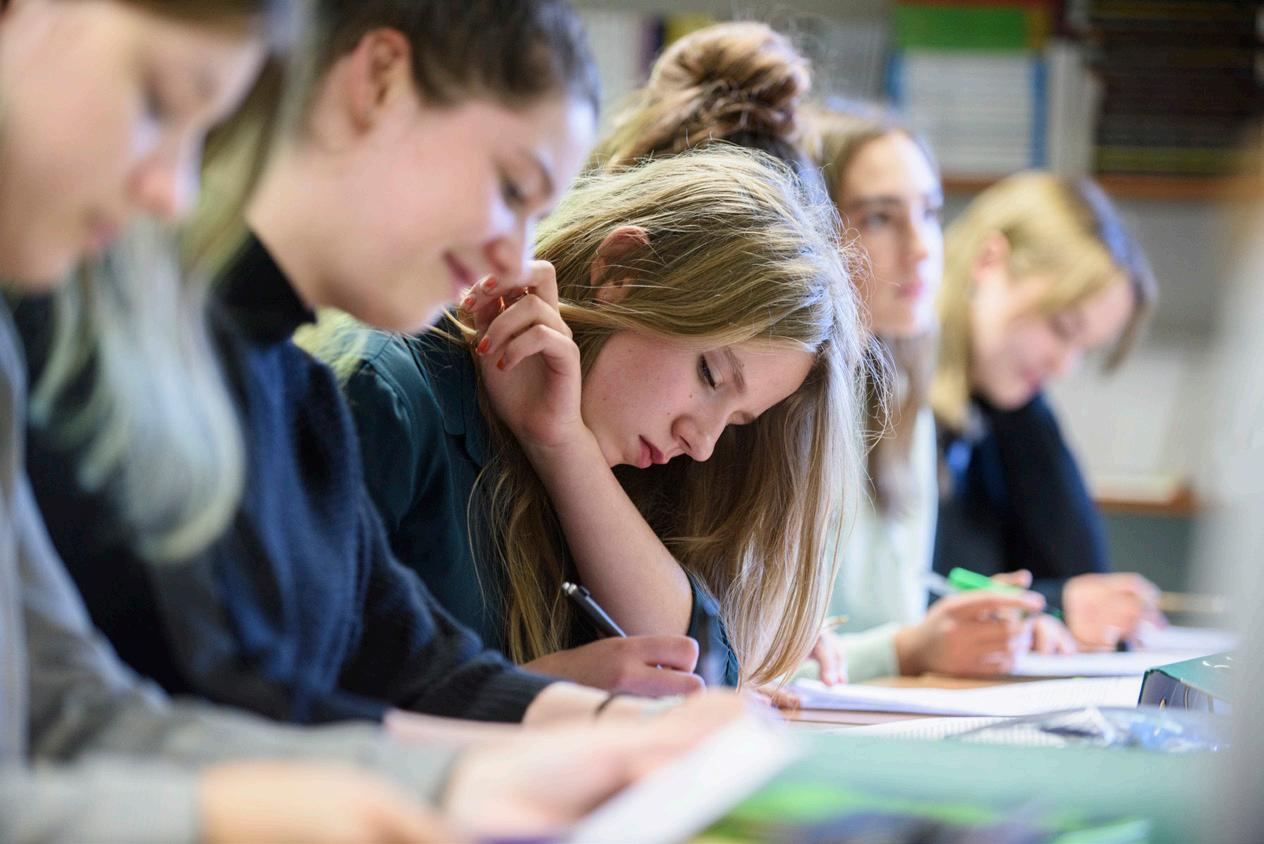
This does not have to be one of the six academic subjects which you have chosen to study but it does need to be something about which you feel passionately and can write in depth.
Once you have chosen your subject, you will be assigned a supervisor, who will support you to narrow down your topic to one that can be handled thoroughly in 4000 words.
Over a period of approximately twelve months, taking you up to the starts of Year 13, you will work through the various stages of research and creation:
– developing your thesis – making notes and learning how to reference properly – gathering evidence
– revising your thesis in the light of the evidence – drafting your essay
– discussing the draft with your supervisor – writing a final essay.
You will be well prepared for any research work that a future university course might present to you, either as an undergraduate or a post-graduate, equipping you for the next stage in your education.
SCAN HERE
to find out more about assessment of this course

This highly regarded critical thinking course is one of the unique features of the IB diploma. It means that all IBDP students engage with deeper questions about ‘how we know?’ from a variety of angles and subject areas.
The course puts the learning from students’ individual subjects under critical scrutiny in a real-world context. It involves a lot of discussion and is an excellent preparation for university as well as being a lot of fun!
In the first year, students begin by looking at the relationship between knowledge and those who claim to know it. What different types of knowledge are there? How is this gained, and what constitutes convincing proof?
We then move on to consider themes including Knowledge and Politics, Knowledge and Technology and Knowledge and Religion. From these investigations students put together their first assessment task: a virtual exhibition of three ‘objects’ based around a prompt. Examples of these prompts include: ‘Who owns knowledge?’, ‘How does the way that we organise knowledge affect what we know?’, or ‘What makes a good explanation?’ Students have really enjoyed this new and innovative form of assessment.
During the second year, students look in more depth at various Areas of Knowledge to assess how knowledge claims work in their different subject areas. These include Natural Sciences, Human Sciences, Mathematics, History and the Arts. This leads to the second assessment, the TOK essay chosen by the student from titles prescribed by the IB and supported by interactions with a supervisor.
There is no such thing as a typical TOK lesson, but past topics have included: an attempt to disprove the claim that Paul the Octopus knew the results of matches in the World Cup in South Africa, critical discussions of animal rights, conspiracy theories, and an investigation into whether bilingual people have access to greater knowledge than those who only speak the majority language.
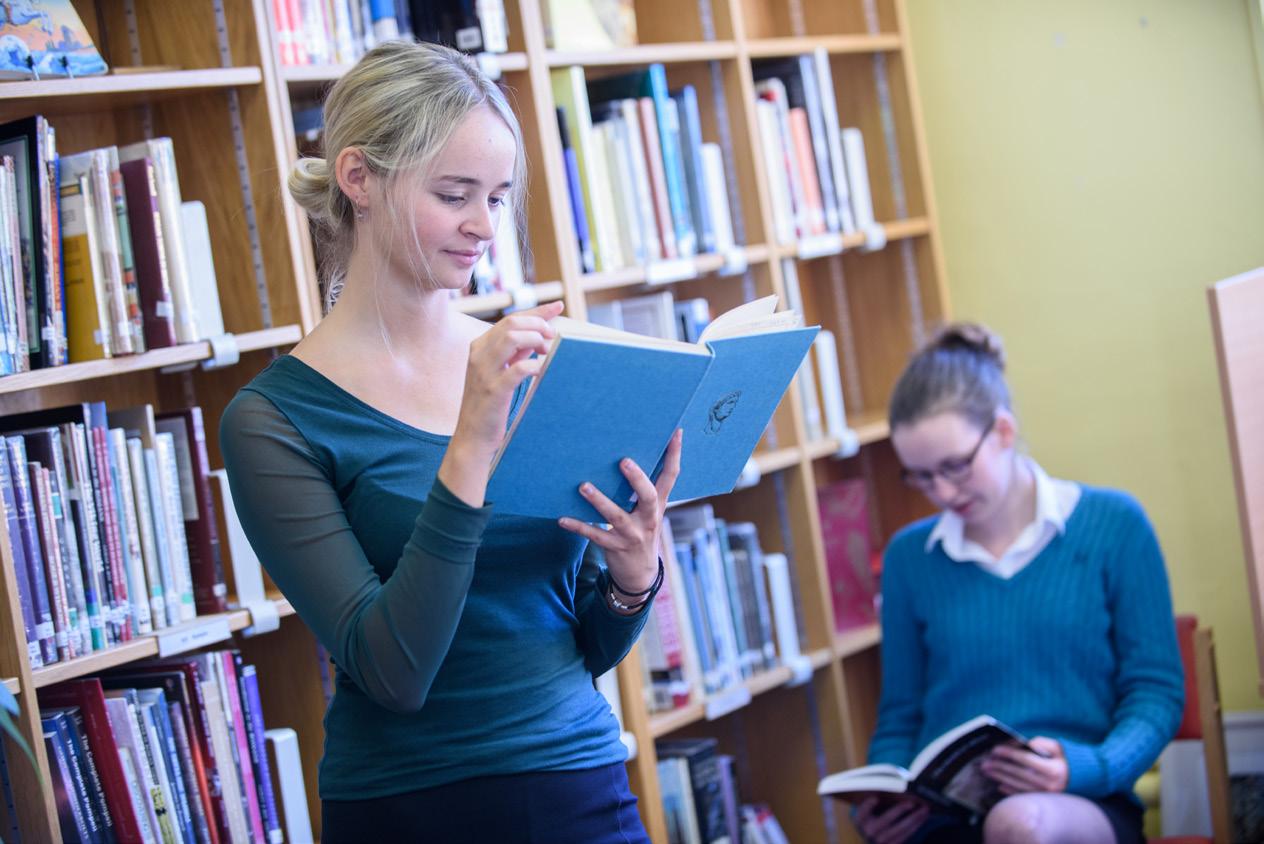
Theory of Knowledge challenges students to question the bases of knowledge, to be aware of bias and to develop a personal way of thinking based on analysis of evidence expressed in rational argument. It is the key element in the IB’s educational philosophy. It unifies and transcends the academic subjects, encouraging appreciation of other cultural perspectives and the development of a coherent approach to learning. Many IB students have commented that Theory of Knowledge is the most fascinating part of the IB Diploma because it draws learning and experience together.
Theory of Knowledge provides students with additional thinking skills and is highly regarded by university admissions tutors. As Howard Gardner, leading Harvard educational psychologist put it, Theory of Knowledge helps students to “think critically, synthesize knowledge, reflect on their own thought processes and get their feet wet in interdisciplinary thinking.”
SCAN HERE to find out more about this course
